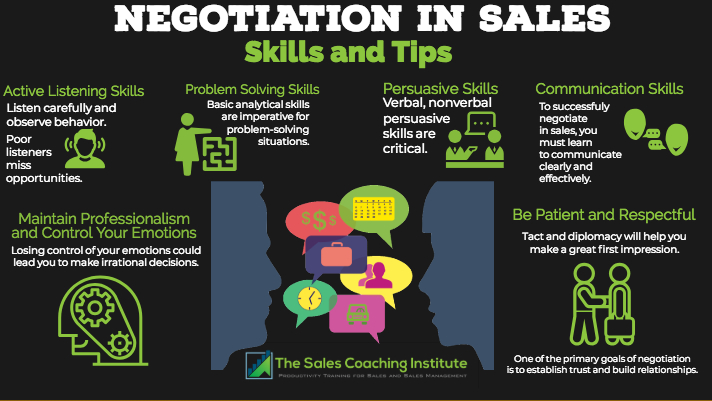Hello!
Sales talks can be stressful times for salespeople. It can be frustrating to think you’re close to closing a deal, only for the prospect to ask, “Can I think about it?”
You can make closing deals easier for your sales team by boosting their skills with sales training to bring in more revenue to your business. Let’s look at five of the best negotiation skills your reps should have to be successful.

Addressing the Right Decision Makers
Many salespeople make the mistake of negotiating with a prospect only to find out they aren’t the final decision-maker. This mistake then leads to a delay in closing a deal as the prospect needs to seek guidance from someone else. This can even lead to the loss of the sale to a competitor who did manage to get to the real decision-maker.
 When a salesperson fails to identify the right decision-maker from the start, they can find themselves in a tough position.
When a salesperson fails to identify the right decision-maker from the start, they can find themselves in a tough position.
Why? For example, let’s say during discussions a rep discussed prices and agreed to give a discount. Later, the right decision-maker may come to talks with this discounted price in mind and ask for a further discount.
These kinds of mistakes can lead to a dip in your profits. So, it pays for your reps to have the skills to identify the right decision-maker from the get-go.
In negotiation seminars, your sales team can learn how to find out who the final decision maker is by asking the right questions that won’t bruise people’s egos.
Listening During Negotiations
Effective sales teams know to actively listen during talks. Don't you have a sales team yet? Here's how to build an unstoppable B2B sales team. Reps are often tempted, especially when discussing price, to jump in first and give discounts to the potential client in the hope of closing the deal.
For instance, a prospect may want to discuss better payment terms. However, before the prospect can ask, the rep offers a discount. The prospect will likely accept the discount and continue to bargain for further concessions, such as better payment terms.
So, your sales reps should master the art of actively listening to the client.
 When salespeople listen more, they can understand the prospect's needs better. Your reps could also find opportunities for more sales, which would help to:
When salespeople listen more, they can understand the prospect's needs better. Your reps could also find opportunities for more sales, which would help to:
- Up-sell
- Cross-sell
- Ask for referrals from the prospect
When reps listen to prospects, they can also learn about other alternatives the prospect may be looking into. Your reps can then show the prospect how your company’s products or services fulfill their company’s needs better than your competitor’s products or services.
 A great way for sales reps to master the art of listening is by attending training with a focus on role-playing. In these sessions, reps can learn:
A great way for sales reps to master the art of listening is by attending training with a focus on role-playing. In these sessions, reps can learn:
- How to ask open-ended questions
- To let the prospect provide answers while actively listening
- To pause for a moment to ensure the prospect has nothing more to add
- To recap what the prospect said to ensure that the rep understood the prospect’s needs
When your reps are armed with skills like these, your team can close more deals.
Providing Value to the Customer
 Salespeople can learn what needs the prospect is looking to fulfill by listening keenly during talks. Your reps can then tailor their pitch to show how your product or service can fulfill those needs.
Salespeople can learn what needs the prospect is looking to fulfill by listening keenly during talks. Your reps can then tailor their pitch to show how your product or service can fulfill those needs.
It pays for the rep to know and understand your product’s features because the rep can easily show the prospect how well your product can fulfill their needs. So, ensure you create time to train your reps about the product’s features and any upgrades you make to your products.
Anchor Your First Offer
Knowing how to make the first offer is especially important during discussions. Bear in mind that in making the first offer to a potential client, you create a psychological anchor to this figure.
Research shows that when an offer is made, most people instinctively fixate on discussing the number presented to them. Therefore, the first offer on the table will likely become the benchmark during price negotiations. That’s why it’s important for reps to make their offer first and to make sure the offer is well thought out.
Other points to consider when making the first offer
When making the first offer, your reps should know the lowest price they can offer so as not to go below this price.
 Reps should also ensure to make a high offer first to reap the benefits that come with the perception of high-value items.
Reps should also ensure to make a high offer first to reap the benefits that come with the perception of high-value items.
People often perceive high-priced products to be better than those with lower prices. A higher price obviously gives your reps room to retreat. As they retreat, they can ask for concessions in return, such as a higher volume order.
However, your reps should ensure that the price they offer is not too high, to not scare off the potential customer. Reps can learn how to make a high offer while maintaining the prospect’s interest.
Additionally, when making an offer, reps should also be careful when offering a price range, because the prospect will always pick the lower price. If this is part of your reps’ game plan, then a price range can work well for them.
Lastly, reps should avoid splitting the difference when making an offer. Why? Say, for example, your product list price is $2000. The prospect offers to buy the product at $1400. If one of your reps offers to sell this product to the prospect at $1600, the final price is highly likely going to end up being $1500.
So, the rep should consider offering to sell the product at $1900 instead. The rep in this situation will not be splitting the difference but instead far more likely to achieve a higher margin.
Knowing When to Walk Away
Sometimes, even with the best sales skills, the talks may not go according to plan, and a rep may not make a sale. One of the main reasons why negotiations can go wrong is because a prospect makes an unreasonable demand and isn’t willing to budge. In this situation, the rep should walk away from the negotiation.
 However, there are times when the rep needs to take some time away from the conversation to weigh up whether the prospect’s demands still allow a win-win outcome.
However, there are times when the rep needs to take some time away from the conversation to weigh up whether the prospect’s demands still allow a win-win outcome.
In situations like these, reps can take time to consult with their manager to figure out if walking away is the best decision for the business. It pays for the rep to actively listen to the prospect to figure out what the prospect really wants.
Sales teams need to differentiate between when to walk away and when to take a break to consider outcomes. You should also emphasize to your salespeople to not make important decisions in a rush.
In some cases, you may find that if the rep walks away from a deal gone wrong, the prospect may become motivated to be more open to compromise. However, in other cases, walking away may be the best decision for your business as you avoid agreeing to deals you could regret later.
You should also train your reps to leave room for future conversations even when they decide to walk away from a deal gone wrong. Why? After more conversations, reps may find opportunities for more sales and even get a chance to ask for referrals.
Bottom Line of Successful Sales Negotiation Skills
It works well in most industries for sales teams to treat prospects like partners. When a rep views a prospect as a partner rather than an adversary, the rep can create a win-win situation.
How can you ensure your reps seek win-win outcomes during talks? One way is to encourage your reps to train in seeking win-win outcomes. Reps can learn how to create common ground and find solutions that are mutually beneficial to both your business and the prospect.
When salespeople are focused on creating a win-win situation, deals become less about winning a competition and more about finding the best outcome for both your business and the prospect. Also, when a rep seeks a win-win outcome, prospects feel that the rep is listening to their point of view. So, prospects are more likely to be flexible and to say “yes” sooner.
- Managers Must Learn Skills That Can’t Be Replaced
- 12 Skills a Creative Project Manager Needs to Have
- The Top 10 In-Demand Tech Skills you need to have
Thank you!
Subscribe to our newsletter! Join us on social networks!
See you!






